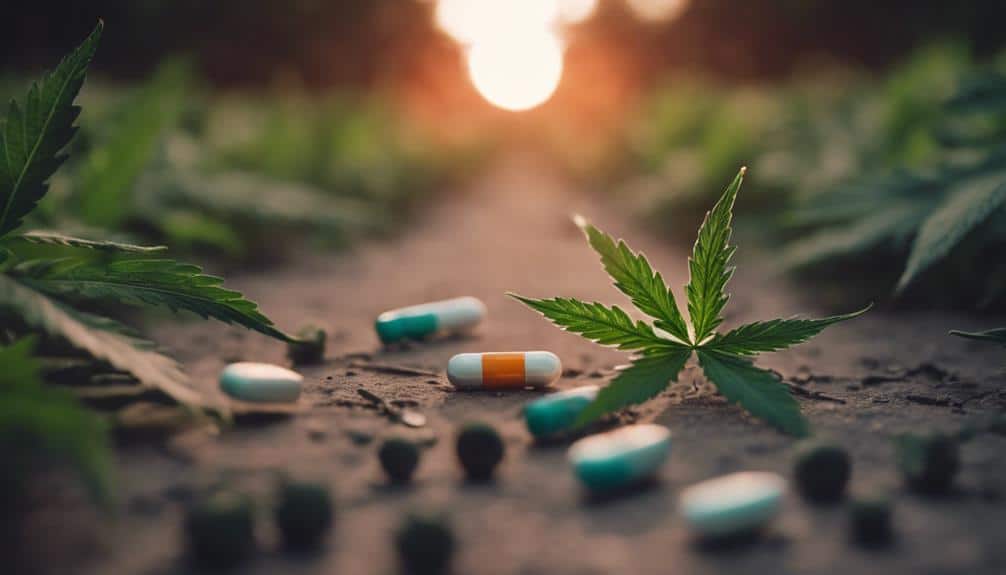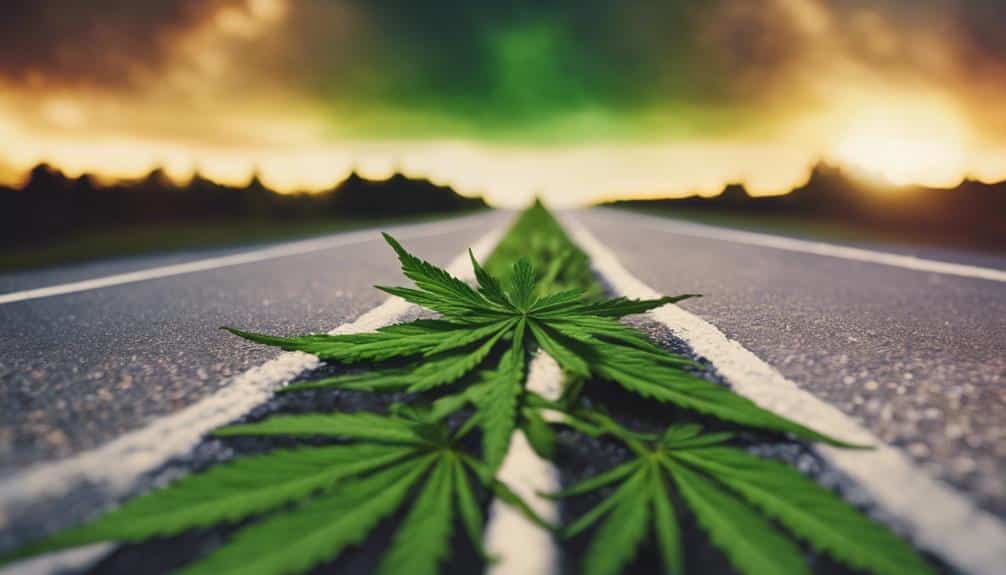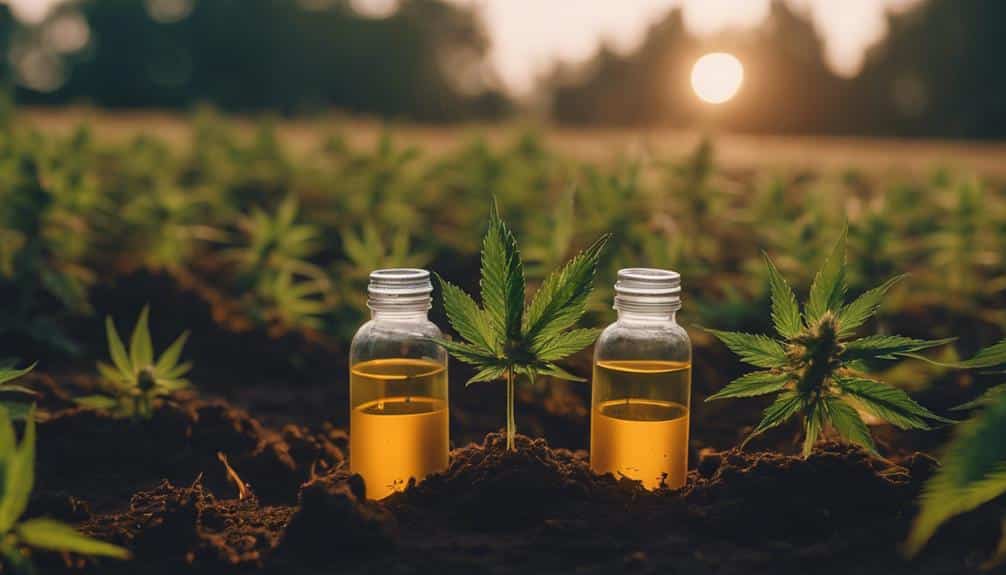While you might perceive cannabis as another substance that could potentially worsen the opioid crisis, it’s essential to consider its potential role in offering an alternative path to recovery.
Table of Contents
Research suggests that cannabis may provide a safer, less addictive option for pain management than opioids.
You’re probably wondering how a controversial substance like cannabis can serve as a solution. Well, it’s an intriguing narrative filled with surprising revelations and supported by compelling scientific evidence that is yet to fully unfold.
Understanding the Opioid Crisis

To fully comprehend the implications of the opioid crisis, it’s crucial first to understand its origins and impact on individuals and communities. The opioid overdose epidemic stands as a severe consequence of this crisis, claiming countless lives annually, leaving families devastated and communities grappling with loss.
Misuse patterns of prescriptions have significantly contributed to fueling the opioid crisis. You might wonder how this happened. It started innocently enough with opioids initially prescribed for severe pain becoming a common remedy for various types of discomfort due to their fast-acting relief. However, their highly addictive nature posed a danger. Over time, misuse increased leading to an overwhelming dependence on these drugs.
The ripple effect of the opioid crisis is vast; touching every facet of our society. It’s more than just statistics; it involves individuals battling addiction, families torn apart, and communities struggling to respond. Your understanding, empathy and desire to help can make a difference. Remember, every step taken to combat this crisis is a step towards healing and restoration.
The Role of Cannabis in Pain Management
As we explore the role of cannabis in pain management, it’s important to note how this plant-based option is turning the tide in the battle against opioid addiction. The science behind it lies in cannabinoid biochemistry. Cannabinoids, the active compounds in cannabis, interact with the body’s endocannabinoid system to help regulate pain.
Differentiation between cannabis strains plays a significant role as well. Not all cannabis plants are created equal. Various strains have differing levels of cannabinoids, making some more suitable for pain management than others.
Your role as a caregiver or health professional is to understand the potential benefits of cannabis such as:
- Providing a safer alternative to opioids for chronic pain relief.
- Reducing the risk of developing dependency or addiction.
- Offering a natural, plant-based option that many patients prefer.
Case Studies: Cannabis Versus Opioids

Building on the potential benefits of using cannabis for managing chronic pain, let’s now look at some real-world examples where cannabis has been compared with opioids. Several case studies have shown promising results regarding addiction comparison. In these studies, patients reported less dependence on opioids when they incorporated cannabis into their pain management plans.
For instance, a study in New Mexico showed a 31% reduction in opioid usage among patients who were also using medical cannabis. But it’s not just about reducing addiction. The therapeutic effects of cannabis appear to provide tangible benefits. Another case from Canada showed that patients using cannabis experienced a significant decrease in pain intensity, improved quality of life, and better overall sleep quality.
This isn’t just about academic studies and cold statistics. It’s about real people fighting their way back to health. It’s about giving them a chance to live without the constant shadow of addiction hanging over them. It’s important to remember that everyone’s journey is unique, and what works for one may not work for another. But these case studies show that cannabis could be a valuable tool in the battle against the opioid crisis.
Legal Implications and Challenges
So, what are the legal implications and challenges associated with using cannabis as an alternative to opioids?
Firstly, you must contend with regulatory barriers. Despite the potential benefits of cannabis in managing the opioid crisis, its use is still illegal in many jurisdictions. This creates a significant hurdle for researchers and healthcare providers alike, impeding access to this potentially lifesaving alternative.
Societal perspectives also play an enormous role. The stigma associated with cannabis use can affect patients’ willingness to try it even if it could potentially help them. This societal attitude can even influence policymakers potentially affecting laws and regulations around cannabis use.
To emphasize:
- Regulatory barriers can restrict research and access to cannabis hindering its use as an alternative to opioids.
- Societal perspectives on cannabis can influence patients’ decisions as well as policymakers’ attitudes.
- The legal implications of using cannabis can vary greatly depending on jurisdiction adding another layer of complexity to this issue.
In navigating these challenges, it’s essential to remember your goal: to serve others. In the face of these legal implications and societal barriers, your dedication to helping those in need remains vital.
Future Prospects: Cannabis as a Solution

Looking towards the horizon of this opioid crisis, you may see the glimmer of hope that cannabis presents as a potential solution. Although we’re still in the early stages of understanding cannabis economics, it’s increasingly clear that with proper controls and regulations, cannabis can be a viable alternative to opioids.
Certain forms of cannabis can help patients manage their pain without the risk of addiction associated with opioids. It represents the next step in addiction prevention offering a safer option for those suffering. However, it’s important to understand that cannabis isn’t a magic bullet. It won’t solve the opioid crisis overnight nor will it completely eliminate the risk of addiction. But it’s a tool in our arsenal that we can’t afford to ignore.
As you consider your role in serving others remember that recovery often involves a combination of different treatments and strategies. Cannabis when used responsibly can be part of that mix. It’s a promising prospect for the future one that could change the landscape of addiction treatment and give hope to those struggling with opioid crisis.
Conclusion
Navigating through the opioid crisis is like crossing turbulent waters but there is beacon of hope – cannabis; potentially acting as a lifeboat in these stormy waters. It’s proven effective for pain management and shows promise as an alternative to opioids. Legal hurdles remain but a brighter future is on the horizon. So, keep faith. We’re not just treading water anymore; we’re charting a course towards a solution with cannabis as our guiding star.
Now, I’d like to invite you to join us on this journey. If you’re interested in learning more about cannabis and its potential role in managing pain and addressing the opioid crisis, why not visit us at Cannabis Docs of Delaware? We have a dedicated team of professionals eager to help you navigate this new frontier. Don’t hesitate to give us a call. We’re here to answer all your questions in a warm, friendly, and inviting atmosphere. The path towards recovery doesn’t have to be traveled alone; let’s explore it together.

